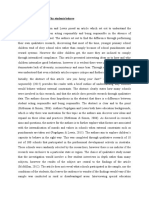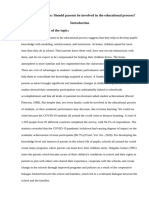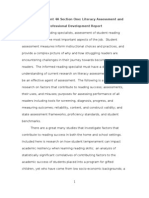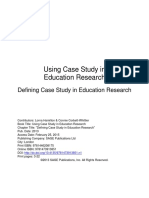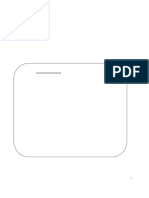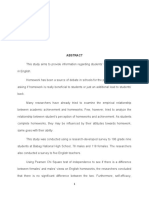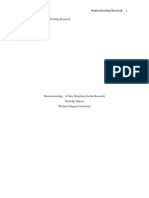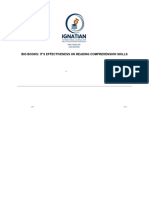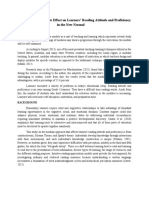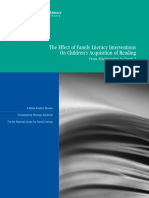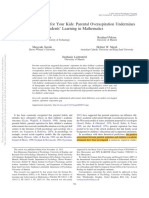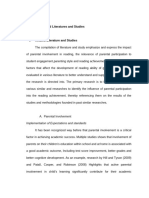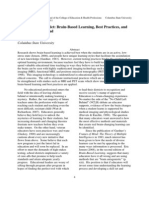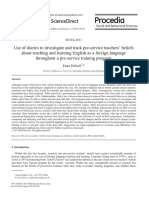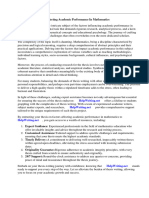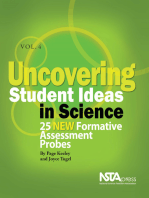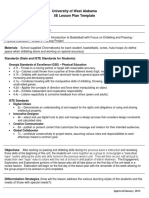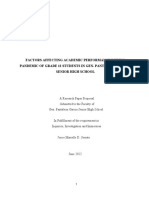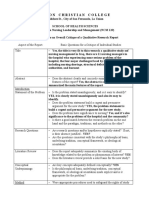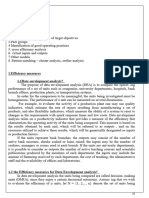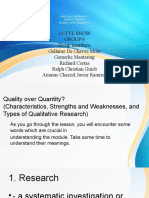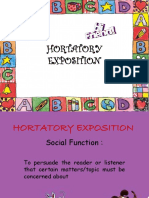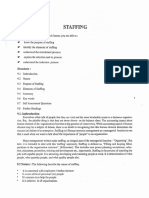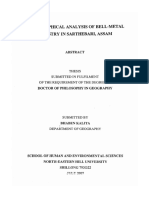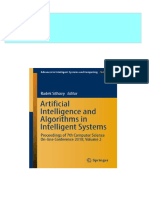Research Project: The Impact of Parental Attitude On Reading Habits of Children in Year 6
Research Project: The Impact of Parental Attitude On Reading Habits of Children in Year 6
Uploaded by
Jeannie Vandesande-McadamCopyright:
Available Formats
Research Project: The Impact of Parental Attitude On Reading Habits of Children in Year 6
Research Project: The Impact of Parental Attitude On Reading Habits of Children in Year 6
Uploaded by
Jeannie Vandesande-McadamOriginal Description:
Original Title
Copyright
Available Formats
Share this document
Did you find this document useful?
Is this content inappropriate?
Copyright:
Available Formats
Research Project: The Impact of Parental Attitude On Reading Habits of Children in Year 6
Research Project: The Impact of Parental Attitude On Reading Habits of Children in Year 6
Uploaded by
Jeannie Vandesande-McadamCopyright:
Available Formats
Research Project: The impact of parental attitude on reading habits of children in year 6
200887964
Research Module
Contents
Acknowledgments .............................................................................................. 3 Abstract .............................................................................................................. 4 The Aims of the study ......................................................................................... 5 Literature Review ............................................................................................... 7 Methodology ....................................................................................................... 9 Findings ............................................................................................................ 14 Discussion of findings ....................................................................................... 39 Conclusion........................................................................................................ 44 References ....................................................................................................... 47 Appendix .......................................................................................................... 50
200887964
Research Module
Acknowledgments
Thanks are due to the year 6 pupils at my school for the time they contributed in order to complete the book diaries, correspondence to their parents. the pupil surveys and deliver
Special thanks go to the year 6 parents who agreed to participate by completing the parent questionnaire and for allowing their children to take part in the survey.
Thanks also go to the year 6 staff for timetabling my activities into their school week and providing information on reading practices and to the school librarian for allowing me to question her on library practices.
Lastly, thanks to the office staff, who were on hand to edit and advise on school protocol where necessary, assist in co-ordinating the delivery of consent letters and questionnaires and collected in the returned surveys, questionnaires and book diaries.
200887964
Research Module
Abstract
This research investigates the impact of parental attitude on childrens reading habits in Year 6; specifically, whether negative or positive parental attitudes are a factor in 9 and 10 year olds dislike or enjoyment of reading. The study endeavours to find out if home reading occurs regularly and what factors impinge on households where little or no home reading takes place.
Information was gathered through a number of processes; questionnaires, surveys, informal interviews and diaries. The research concludes that although attitude itself is hard to measure, parental directed factors do impact in positive and negative ways on childrens reading habits. In particular, that some parents believe once children are secure confident readers they do not need reading support. The study also found that most children who read every day do so independently; either at school or home. The research established that reading for pleasure was an infrequent occurrence. In addition, findings showed that technology such as television, computers and the internet prove popular alternatives to reading books.
200887964
Research Module
The Aims of the study
Children differ in their approach to reading due to factors such as confidence, ability and attitude. Teaching practices, resources and curriculum all play a role in a classroom context. These factors can also be magnified by parents within the home environment which can present a different set of barriers; namely, parental work patterns. The learning support assistant faces many challenges when motivating reluctant readers and knowledge of parental attitude and its impact can be helpful.
This study aims to investigate parents views on reading and how those views impact upon their children. Children who have access to a wide variety of reading materials and whose parents enjoy reading are more likely to inherit good reading habits (McQuillan, 1998; National Literacy Trust, 2009 and Wang, 2000).
The idea of action research is defined by Bell (2005: 8-9) as relevant in any situation which necessitates a change in practice or approach. The study aims to discover if any changes are necessary to encourage children to read more regularly and how school can increase parents involve ment in reading if it is found to be infrequent. The Department for Education has supported several
5
200887964
Research Module
reading initiatives and want to further develop reading for pleasure. In terms of literacy, the United Kingdom is ranked 25th worldwide, a slip of 18 places since 2005 (Gove, 2011).
There are a number of limitations within this piece of research. A small study such as this has restraints in terms of time and methodology linked to interpretation of the data and sample size. This inter-connected relationship was considered at the beginning of the research process in order to help develop ideas and methods.
200887964
Research Module
Literature Review
Several pieces of research have found reading to children and providing books at home influences later reading attitudes (Davis-Kean and Eccles, 2003; Ellsworth et al, 1995; McQuillan, 1998; Wang, 2000).
Research carried out by the National Literacy Trust (NLT) in 2009 highlighted the links between enjoyment, attainment and attitude. They also found that this relationship declines with age, particularly attainment and enjoyment of reading towards the end of Key Stage 2. The relationship between enjoyment and frequency, which was also found to decline, could be explored through the book diaries in the proposed research.
Wang (2000) analysed influences on childrens attitude to reading and highlighted experience as a major factor. Repeated tests and assessments can result in stress and frustration for children, leading to lowering pupil selfconfidence. This is particularly relevant in Year 6 where Statutory Assessment Tests (SATs) present anxious situations for many pupils who perform well in a classroom context. Wang also reported that parental experiences of education impacted upon childrens attitude. Those who provided books and resources could be a positive influence. However, Wang continues by suggesting parental
200887964
Research Module
praise and reinforcement builds confidence and parents who read to children provide good role models. If the proposed research finds parents do not read to their children or provide shared reading experiences, could assumptions be made regarding these childrens development?
Ellsworth et al. (1995) also found that for academic reading, attitudes steadily decreased and this was related to ability. Those who struggled with reading developed negative attitudes more quickly than those who achieved age-related expectations. This resonates with observations made in the setting used for the proposed research although attainment is not the research focus here. However, as with the proposed study, Ellsworth et al. (1995) have acknowledged the difficulty in measuring attitude. This could be due to the methods used to gather information. Furthermore, their study looked at differences between academic and recreational reading and whilst the proposed study does consider the purpose of pupil and parents reading, it is not the main focus.
McQuillan (1998) reported a link between access to reading material and how much reading was done; this will be a focus of the proposed study as pupils have good access to books and other text at school. It is personal choice or environmental factors which will affect how much reading takes place.
200887964
Research Module
Methodology
In order to accumulate the necessary information, consideration of the varied methods was crucial; questionnaires, surveys, diaries, observations and interviews were all contemplated. By taking into account the time and interpretation each required and the impact upon lessons, some of them were discounted. For example; pupil interviews were impractical due to sample size. Qualitative and quantitative methods were applied to this study to provide opportunities for triangulation. Hopkins discusses the data collection process and summarises by adding individual methods can be used as single sources to effect change or collectively for a more thorough examination (2008: 126).
Questions of validity and reliability needed addressing. For example; would another researcher carrying out the same research in the same environment get similar results to this study? The researchers established relationship with the setting, parents and pupils could affect responses. It could be argued that this study is setting-specific. In attempting to gauge attitude, which in itself is idiosyncratic, the findings may not be representative of all year 6 parents and pupils in all settings. Cross-referencing through triangulation will serve to
validate findings from the varied sources. This method is recommended by Brundrett et al. (2008: 170).
200887964
Research Module
Next, consideration of the sample number was necessary; there would be 63 pupil surveys to interpret if all parents returned the survey consent forms (Appendix 1). Likewise, for the parental questionnaire (Appendix 3); in all probability the parents who allowed their children to take part, would also agree to complete and return their own questionnaire resulting in similar, if not the same, numbers of pupil and parent responses. By inviting the whole Year 6 cohort to take part, the issues of gender, aptitude and home environment were eliminated. In addition, by including the whole year group, generalisations could be made about any findings as the final sample group would reasonably represent the population of year 6. Furthermore, the expectation was that some pupils and parents would not agree take part in the research, in light of this, I would still have a good representative sample.
The pupil surveys (Appendix 2) were chosen to give a defined picture of the childrens reading habits in a home context. Questions were varied in format; closed, multiple choices, both single and multiple answers and took account of the respondent. For example, the pupil surveys were worded using more childfriendly language than the parental questionnaires. Bell (2005: 143-4) warns researchers away from leading, presumptuous and sensitive questioning. In designing questions to provide the required information, researchers who consider the language used can obtain the necessary information.
10
200887964
Research Module
The questionnaires and surveys would be easy to collate using simple tally charts and graphs whereas interviews would required time for interpreting and presenting the responses. The questionnaires and surveys are both qualitative and quantitative, in that they give parents views and perceptions of reading in addition to numerical data, contributing to the hypothesis as much as the childrens diaries and staff interviews.
Care needs to be taken over questionnaire design. Bell (2005: 145) recommends beginning with straightforward questions and leaving
increasingly complex ones towards the end. Open questions were avoided due to issues with interpretation and time. However, Brundrett et al. (2008: 93) describe these types of questions as a useful tool when looking for common patterns or can provide useful extracts in the findings which may add colour to any argument. The parental questionnaires included some opportunity to add
other information. While this required more interpretation, it offered valuable evidence of attitude, just as Brundrett et al. (2008) advised.
The book diaries were a daily log chosen to provide specific information such as how much time is spent reading. The diaries were introduced to pupils in each class with written instructions as to what should be included. This was displayed in each Year 6 classroom throughout the week (Appendix 5).
11
200887964
Research Module
The informal interviews with teaching staff and the librarian provided specific information which could prove useful in supporting pupils and parents claims. The questions asked (see Appendix 6 and 7 respectively) were open and required very specific responses surrounding teaching practices and school policy; for example, the librarian could observe the numbers of year 6 pupils and parents visiting the library that week. This recorded information would take minimal time and interpretation due to the small sample size (three).
Figure 1 shows how these methods will provide opportunities for triangulation of the results collected. Hopkins (2008: 133) describes triangulation as the practice of collecting data from three varied outlooks. This serves to validate findings, in other words, deciding whether the interviews, diaries, surveys and questionnaires calculate what was intended to be measured or determined. This also provides opportunity to cross reference each source, for example, the number of children who visit the school library with their parents can be confirmed by the interview with the school librarian.
12
200887964
Research Module
Pupil Surveys and Book Diaries
Triangulation of data
Parent Questionnaires
Staff Interviews
Figure 1 Triangulation of different methods of data collection
To address the ethical issues of carrying out research, the parents received a consent letter for the pupils to participate in the survey. The pupils themselves received a verbal explanation of the research, due to their age, they were able to understand and make an informed decision about taking part. A cover letter (Appendix 4) was attached to the parent questionnaire explaining the research and giving guarantees of anonymity. This allowed for a balance of pupils and parents right to privacy with the need for information. Hopkins, (2008: 202) Brundrett et al. (2008: 52) and Bell (2009: 157) agree that ethical protocol must be followed, in particular by informing all those involved in the study about what it involves and, importantly, who the information will be shared with.
13
200887964
Research Module
Findings
Pupil Survey The pupil survey consisted of 10 questions and the sample number was 45. Questions 4, 5 and 10 prompted more than one answer so the total number of responses differs from the sample of 45.
1. Do you take a book home every day?
Number of children who took a book home every day
35 30 25 20 15 10 5 0 YES NO Response Number of pupils
This graph shows 71% of children take a book home every day.
14
200887964
Research Module
2. How many times do you read to an adult each week?
Number of pupils who read to an adult each week?
40 35 Number of pupils 30 25 20 15 10 5 0 0 1 to 3 4 to 6 7 Number of times read
This graph shows 82% of pupils are heard by an adult every week, however, none of the sample read to an adult every day and 13% never read at all.
15
200887964
Research Module
3. What time of day do you normally read to an adult?
Times pupils normally read to an adult
18 16 Number of pupils 14 12 10 8 6 4 2 0 Before school After school Before tea Response After tea Other
This graph shows the most popular time for reading to an adult is in the period after school before tea, with 26% choosing straight after school and 37% before tea. Only 4% read before the school day.
16
200887964
Research Module
4. What activities stop you from reading each day?
Reasons given for not reading
35 30 Number of pupils 25 20 15 10 5 0 Television Computer Busy parents Noisy siblings Playing with After school friends clubs Response other
This graph shows 66% of pupils (two thirds) cited computers as the most commonly preferred activity. 24% of pupils said their parents were too busy to hear them read. There were intriguing reasons given in the Other, please specify category; 1. Walking dog 2. Having fun 3. Too tired
17
4. Asleep 5. Looking after siblings 6. Household chores
200887964 Module
Research
7. Music lessons
5. What do you choose to read to an adult?
Reading material choice
25 Number of pupils 20 15 10 5 0 School reading book School library book Local library book Response Own choice Other
This graph shows only 11% read their school reading book at home. The pupil who stated other specified they were a free reader and could read anything they wanted. That means they are not on any school reading scheme, but can choose anything from the classroom shelf, this can still technically be classed as a school reading book.
18
200887964
Research Module
6. How many times does an adult read to you each week?
Number of times adult reads to pupil
50 Number of pupils 40 30 20 10 0 0 1 to 3 Response 4 to 6 7
This graph shows 91% of pupils said an adult never read to them and only 9% were read to by an adult 1 to 3 times a week.
19
200887964
Research Module
7. Do you visit the school or local library with your parents each week?
45 40 35 30 25 20 15 10 5 0 YES Response NO
Number of pupils
Number of pupils who visit school library with parents Number of children who visit local library with parents
This graph shows pupils who visit a library is 42%.
20
200887964
Research Module
8. Do you ever read any of the following? Circle all the ones you read.
Other reading materials pupils read
35 30 Number of pupils 25 20 15 10 5 0 Newspapers Magazines Comics Response Websites Other
This graph shows websites are the most common reading material other than books. 71% said they read websites and 68% said they read magazines. 13% of children said they read something else, which was specified as recipes, instructions and sports articles.
21
200887964
Research Module
9. Do you enjoy reading?
Pupils who enjoy reading
25 20 Number of pupils 15 10 5 0 Very much Quite a lot Response A little bit Not at all
Less than half the sample (44%) said they did not enjoy reading at all. 20% of pupils did enjoy reading very much.
22
200887964
Research Module
10. Is most of your reading for?
What pupil read for
30 25 Number of pupils 20 15 10 5 0 Pleasure School/home work Response Other
The majority of pupils responded that they mostly read for school or homework related tasks (62%). Only 12 pupils read mostly for pleasure. The categories given for other included finding out team sports results, looking at cinema listings or other information sources.
23
200887964
Research Module
Parent Questionnaire 62 questionnaires were sent out to parents via their children. A cover letter explaining the research project was attached to the front of the questionnaire and instructed parents to return it by a certain date. Parents who did not wish to participate in the research did not return the questionnaire. The total sample number was 23.
1. Do you enjoy reading?
Number of parents who enjoy reading
10 9 8 7 6 5 4 3 2 1 0 Very much Quite a lot Responses A little bit Not at all
This graph shows only 17% of parents enjoyed reading a lot, whilst 17% did not enjoy it at all.
Number of parents
24
200887964
Research Module
2. How often do you read a book?
Frequency of book reading by parents
16 14 Number of parents 12 10 8 6 4 2 0 Never At least once a week Between 2 to 3 times a week Responses Every day
This graph shows 60% of parents never read a book and only 8% of parents read from a book each day.
25
200887964
Research Module
3. What is the majority purpose of your reading?
Purpose of parent reading
16 14 Number of parents 12 10 8 6 4 2 0 Pleasure Work Academic/study Responses Other
This graph illustrates the commonest purpose for parents reading is work related. 60% of parents read mainly for work whilst 30% read for pleasure.
26
200887964
Research Module
4. How many times do you or another adult listen to your child read each week?
Number of times adult listens to pupil
20 Number of parents 15 10 5 0 0 1 to 3 Responses 4 to 6 7
This graph shows that none of the parent responders never listen to their child, whilst only one listens every day to their child. The most common response was 1 to 3 times a week with 78% of parents.
27
200887964
Research Module
5. How many times do you or another adult read to your child each week?
Frequency of parents reading to child
14 12 Number of parents 10 8 6 4 2 0 0 times 1 - 3 times Responses 4 - 6 times Every day
This graph shows 52% of parents never read to their children.
28
200887964
Research Module
6. When your child reads to you, which of the following do they choose?
Choice of book when pupil reads to adult
14 12 Number of parents 10 8 6 4 2 0 School reading book School library book Local library book Responses Own choice Other
This graph illustrates that 52% of pupils choose their own book to read whilst 35% read their school reading book.
29
200887964
Research Module
7. When you read to your child, which of the following do you read?
Choice of book when adult reads to pupil
16 14 Number of parents 12 10 8 6 4 2 0 School reading book library book Your choice Responses Their choice Other
This graph shows 60% of adults allowed the children to choose which book an adult read to them. Seven parents did not respond to this question.
30
200887964
Research Module
8. Do you visit the school or local library with your child?
25
20 Number of parents
15 Parents who visited the school library with child 10 Parents who visited the local library with child
0 YES Response NO
This graph represents the number of parents who visit either the school or local libraries. 9% visit the school library compared with 30% visiting the local library.
31
200887964
Research Module
9. Does your child have good access to books at home?
Access to books
16 14 Number of parents 12 10 8 6 4 2 0 Yes, we own books Yes we borrow from library Responses No
This graph shows that all parents responded positively when asked if children had good access to books at home that were either owned or borrowed from a library.
32
200887964
Research Module
10. Given the opportunity, does your child read any of the following?
Other reading material choices
25 20 Number of parents 15 10 5 0 Newspapers Magazines Websites Recipes Responses Comics Instructions Other
This graph demonstrates the other reading materials the pupils access on a weekly basis. 91% said their child read magazines, 82% cited websites as another source of reading material and 43% said comics; the respondent who specified other named teletext as a reading matter.
33
200887964
Research Module
Pupil Book Diaries
The next set of graphs record the responses collated from the pupil diaries. 59 pupils each made a book diary and recorded specific information as requested. This included where they read, who to, what they read and when. In some cases data has been represented by modal numbers due to multiple answers; this will be specified where applicable. Class 1 totals 27 pupils and class 2 totals 32.
Evidence the child reads at home
30 25 Number of pupils 20 15 10 5 0 None recorded 1 to 3 Response 4 to 6 7
Class 1 Class 2
34
200887964
Research Module
This graph illustrates 54% of pupils had no written record in their diary of reading at home and only 6% of the year group read every day.
Person most often read to in 7 day diary (modal result)
25 20 Number of pupils 15 10 Class 1 5 0 Class 2
Response
This graph shows that pupils in class 1 are more likely to read at school to a teacher, teaching assistant (TA) or independently. Class 2, on the other hand, recorded evidence of reading at home to Mum, Dad, Grandparents and independently. 37% of pupils recorded they read at home.
35
200887964
Research Module
Most common times of day children read
20 18 16 Number of pupils 14 12 10 8 6 4 2 0 6 - 8:30 am 9 - 12 noon 1 - 3:15pm 3:30 - 6pm 6 - 8:30pm Response 8:30 11pm Nothing recorded Class 1 Class2
These results represent the mode of the times children read each day. The majority of class 1 read at school (44%), whilst 6% of pupils in class 2 read at school. 15% of pupils had not stated whether they had read at home or at school.
36
200887964
Research Module
Staff Interviews The staff interviews were of an informal nature and included the school librarian and the two year 6 class teachers. The teacher interviews took place during the school day, but not whilst in class with pupils present.
Year 6 teacher interviews The teachers had different practices as regards ensuring reading was done at home. The class1 teacher put the responsibility on the children in deciding when their books should be taken home. The teacher from class 2 acted to ensure reading books and records went home every night but stated she knew many children did not read at home every night.
By using evidence from the reading records (parent entries and signatures) teachers can determine the regularity of home reading. The teacher from class 2 checks the pupils records once a week and uses the records as a communication tool with parents. The class 1 teacher was not clear how much reading happens at home, but was confident that they all read to either herself or the TA once a week. The class 1 teacher indicated many pupils sign on behalf of parents however; the class 2 teacher indicated she expected to see at least two entries from parents themselves.
37
200887964
Research Module
In response to how school encourages parents to read to children the teachers identified a number of initiatives used; these included; volunteer reading schemes access to the library after school parents evening discussions communications in reading records
Librarian Interview (see Appendix 5) The book diaries and pupil surveys were completed in the same week; the parents questionnaire was sent out at the end of that same week and given a return by date of a week later. The school librarian was interviewed two weeks after the pupils had completed the book diaries and surveys and a week after the parent questionnaires were returned. This allowed for any visits by pupils and parents to be noted by the librarian within that two week period.
The librarian observed that no pupils from year 6 had visited the library with their parents for the two week period in which the pupils completed the book diaries and surveys and the parents completed the questionnaires. However, two year 6 pupils attended homework club but did not use any of the librarys research or borrowing facilities during that time.
38
200887964
Research Module
Discussion of findings
The parent questionnaires revealed that many parents do listen to their children read but only one, two or three times a week. This could be for several reasons; work commitments, family and time constraints. 82% of pupils (37) stated they had read to an adult that week between1 to 3 times, 83% of parents (19) circled the same response; this does show a positive correlation despite numerical differences in parent and pupil samples. However, whilst 6 pupils claimed parents never listened to them, none of the parents admitted they never listened to their child. There are explanations for this; firstly the parents of the pupils who responded to this question may not have completed the questionnaire themselves. Secondly, parents could be unwilling to admit the fact they do not listen to children read. Fear of parenting criticism or feelings of guilt about lack of quality time spent with children could be a factor. Palmer observes parental guilt can be linked to overindulging the child to compensate for not spending enough time with their children (2007: 115).
Findings regarding parents reading to their children show 41 pupils said their parents did not read to them during the week, yet only 12 parents replied to the same question. 10 parents said they read between 1 and 3 times a week, but only 4 children answered in that category. Again, reasons for this could be due to guilt about lack of focused attention on reading due to time. It could also
39
200887964
Research Module
indicate that parents feel by year 6, children need little input from them in terms of reading. Although reading aloud to children has been called the single most important activity for building the knowledge required for successful reading (Armbruster et al., 2006:4); one parent wrote I dont read to my child. My child is very independant [sic] (parent responder, 2011). Another wrote, This set of questions is not relevant to my child who at the age of 11 can read to a high standard (parent responder, 2011). These statements show parents who know their children read to a high standard are less likely to hear them read. The fact that some children are confident, independent readers could reflect the early positive reading experiences which Wang (2000) highlighted as vital to reading success. Other influential factors for parents not reading may be parents who are self-doubting readers themselves. Furthermore, parents who recall negative educational experiences may pass on negative attitudes to children by not reading or listening to them. The statements from parents given above could be construed as negative.
The fact that only 17% (four) parent responders reported they enjoyed reading very much and only two parents picked up a book every day could have some bearing on attitude to reading. The majority of parents stated the main purpose of their reading was for work and interestingly, the pupils gave a similar response, citing school based tasks as their main reason. In total, 12 pupils read for pleasure; around a sixth of the year group. This is an important finding
40
200887964
Research Module
in terms of the hypothesis. It is interesting to note children see their reading as a task related to school work, a chore or requirement rather than something to be enjoyed. Whether or not this is inherited from parents own reading habits is purely speculative and not addressed sufficiently within this study.
The findings show that children do have good access to a range of text within the home. The diaries suggested children read from newspapers, comics and websites as well as books. However, they may view this type of reading as different to reading their school books. Perhaps if the survey had asked pupils to categorize the types of reading materials they accessed into school-based tasks or pleasure reading, a stronger picture could have emerged.
Technology has made a huge impact upon work, society and lives in general; as the survey discovered. 28 children stated they watched television rather than read, 30 played on computers, 27 played with friends and 19 were busy at after school clubs. Only 11 children (24%) declared their parents were too busy. However, this question was not included on the parent questionnaire because of sensitivity. There was some concern that parents might feel criticised on their parenting practices and it was considered unlikely that parents would admit being too busy as a factor.
41
200887964
Research Module
There was inconsistency regarding the library visits. Although 4 children said they visited the library with their parents and 2 parents agreed, the school librarian claimed no year 6 children or parents had visited the library in the two week period of the research study, and this was validated by school records. This abnormality could be due to visit times outside the observed period or question misunderstandings. Again, parental feelings come into play; guilt or embarrassment at not using school resources could prevent parents from responding honestly. From a pupil perspective, it could be due to peer pressure or to say what they think people might want to hear, as Hopkins describes, ...to produce right answers (2008: 120). Wang (2000) suggests visiting libraries is an important element of discovering stories but the NLT (2009: 16) found visiting the library was falling out of fashion.
The differences between practices in the two classes are evident from the book diaries and could be a factor in childrens different reading approaches. 24 children from class 1 did not read at home, however only 8 children from class 2 did not read at home. The interviews revealed that the class 1 teacher does not check the children take books home, but the class 2 teacher checks every day. Even with this practice, findings from the pupil survey show that those children who take books home every night do not necessarily read them. If pupils know class teachers do not promote home reading, will this influence them? The
42
200887964
Research Module
findings show it does. Here then, it could be argued attitudes also stem from other significant adults.
43
200887964
Research Module
Conclusion
In conclusion, the findings show that although children do read at home, many do so independently of their parents. In terms of parents attitudes, this was found hard to measure. The small number of parent responders could be an indication of the parents lack of interest in their childs reading habits or suggest negative attitudes do exist, but this is purely speculative. Parents own reading skills may be an influence too, negative school experiences and lack of confidence in their own reading will further influence negative attitudes. This, factored with the purposes of reading as being work or school related, may indicate parents and pupils see reading as a chore rather than a pleasure. Positive attitudes stemming from early shared reading experiences between parent and child could result in the independent secure readers described by some parents. Indeed, many parents do not read to their children mostly because they believed it is not necessary in year six and as stated, their children are self-governed readers. Had the study focused on a smaller sample group, (perhaps 10) more specific questioning and detailed analysis could have addressed attitude in relation to attainment.
The diaries suggested that children do enjoy reading and the narrative within reflects some enthusiasm. It is unclear from this study however, whether this stems from parental or classroom practice. According to the pupils, factors such
44
200887964
Research Module
as time, siblings, lifestyle and work commitments all influence how much reading parents do with children. The diaries also reflected that many of the children read at home during the evening on their own.
The research has highlighted that differences in teaching practice can present mixed messages to pupils and parents and therefore create negative attitudes. Parity between classes is vital for consistency and the shared goals of the whole school. Other recommendations may be to promote the library as a resource for parents. This may also have a positive effect on pupils. ICT proved a popular alternative to reading; interestingly however, the children do not seem to recognise this as a reading activity itself.
Acknowledgement of the research authors strong relationship with the setting caused some difficulty with bias. The parent questionnaire could have asked more searching questions in terms of why parents listened to or read to their children so infrequently. Familiarity with the parents resulted in designing questions which would not cause offence and perhaps were not applicable to the hypothesis. Furthermore, the reliability of some of the findings could be questioned since triangulation of information from parents, pupils and the librarian were shown to be contrary.
45
200887964
Research Module
Lastly, the study has suggested that children are reading whether independently or with significant adults at school or at home. This is a positive discovery of the study even though not the main focus. Furthermore, it must be acknowledged that findings show children are reading a wide range of other materials at home including magazines, newspapers, instructions and recipes; this is significant as it is taking place at home. The NLT (2009) found that fewer children were reading electronic media, newspapers and magazines in 2009 than in 2005; however, this study has shown that many pupils prefer these types of media to books.
46
200887964
Research Module
References
Armbruster,B., Lehr, F. and Osborn, J. (2006) A Child Becomes a Reader: Proven ideas from research for parents [online], Education Resources Information Centre (ERIC). Available: http://www.eric.ed.gov/PDFS/ED501551.pdf [Accessed 20 April 2011].
Bell, J. (2009) Doing your Research Project (4th edn.). Berkshire: Open University Press.
Brundrett, M., Burton, N. and Jones, M. (2008) Doing your Education Research Project. London: Sage Publications.
Davis-Kean and Eccles (2003) Influences and barriers to better parent-school collaborations, The LSS Review [online], 2(1) pp4-5. Available: http://www.temple.edu/lss/pdf/lssreview/lssrev_sfp.pdf [Accessed 4 April 2011].
47
200887964
Research Module
Ellsworth, R., Kear, D. and McKenna, M. (1995) Childrens attitudes toward reading: A national survey, Reading Research Quarterly [online], 30(4). Available: http://www.jstor.org/pss/748205 [Accessed 19 April 2011].
Gove, M. (2011) Reading [online], Department for Education. Available: http://www.education.gov.uk/inthenews/articles/a0076401/michael-gove-articlein-the-daily-telegraph-about-reading [Accessed 23 April 2011].
Hopkins, D. (2008) Classroom Research (4th edn.). Berkshire: Open University Press.
McQillan, J. (1998) The Literacy Crisis: False Claims, Real Solutions. Portsmouth, NH: Heinemann.
National Literacy Trust (2011) Young Peoples Reading and Writing: An indepth study focusing on enjoyment, behaviour, attitudes and attainment [online]. Available:
48
200887964
Research Module
http://www.literacytrust.org.uk/assets/0000/8266/Attitudes_towards_Reading_W riting_Final_2011.pdf [Accessed 23 April]
Palmer, S. (2007) Detoxing Childhood: What parents need to know to raise bright, balanced children. London: Orion House Publishing.
Wang, X. (2000) Childrens Attitudes Toward Reading and Their Literacy Development, Journal of Instructional Psychology [online]. Available: http://findarticles.com/p/articles/mi_m0FCG/is_2_27/ai_63365166/ 12 April 2011]. [Accessed
49
200887964
Research Module
Appendix
Appendix 1: Consent letter for pupil survey participation Appendix 2: Pupil Survey Appendix 3: Parent Questionnaire Appendix 4: Cover letter for parent questionnaire Appendix 5: Guidelines for book diaries Appendix 6: Teacher Interviews Appendix 7: Librarian Interview
50
You might also like
- DiGiorno Pizza - Group 1Document3 pagesDiGiorno Pizza - Group 1Anonymous h2EnKyDb57% (7)
- OutlookDocument31 pagesOutlookSayantan BhattacharyaNo ratings yet
- The Truth About Homework from the Students' PerspectiveFrom EverandThe Truth About Homework from the Students' PerspectiveNo ratings yet
- Students' Voices Regarding Homework (Third Edition)From EverandStudents' Voices Regarding Homework (Third Edition)No ratings yet
- Rabiyah D. Quines (RESEARCH 2)Document21 pagesRabiyah D. Quines (RESEARCH 2)Charmaine MacayaNo ratings yet
- RRL RrsDocument8 pagesRRL RrsChloie Marie RosalejosNo ratings yet
- A Mixed Methods Design To Investigate Student Outcomes Based On Parental Attitudes, Beliefs, and Expectations in Mathematics EducationDocument16 pagesA Mixed Methods Design To Investigate Student Outcomes Based On Parental Attitudes, Beliefs, and Expectations in Mathematics EducationChristine VillarinNo ratings yet
- ACSPRISocialScienceMethodologyConference2016 DayaDocument16 pagesACSPRISocialScienceMethodologyConference2016 Dayaعلینہ ارشدNo ratings yet
- ACSPRISocialScienceMethodologyConference2016 DayaDocument16 pagesACSPRISocialScienceMethodologyConference2016 DayaDeseirae Jane TumanodNo ratings yet
- Bano Et Al 2018 Perceptions of Teachers About The Role of Parents in DevelopingDocument18 pagesBano Et Al 2018 Perceptions of Teachers About The Role of Parents in DevelopingSadruddinNo ratings yet
- Research Essy 1Document4 pagesResearch Essy 1api-518405423No ratings yet
- Introduction MeirzhanDocument3 pagesIntroduction Meirzhanmirjan004No ratings yet
- Research On Student AssessmentDocument20 pagesResearch On Student AssessmentElaine VazquezNo ratings yet
- EditingDocument8 pagesEditingFaheem Ali KhokharNo ratings yet
- Suey Researchsummary1Document5 pagesSuey Researchsummary1api-340409501No ratings yet
- Defining Case Study in Education ResearchDocument24 pagesDefining Case Study in Education Research:....No ratings yet
- Thesis Parental Involvement Student AchievementDocument8 pagesThesis Parental Involvement Student Achievementjensantiagosyracuse100% (4)
- Stakeholders' Perceptions On "No Homework Policy" in A Philippine Public Secondary SchoolDocument12 pagesStakeholders' Perceptions On "No Homework Policy" in A Philippine Public Secondary Schoolm.a.veronica labataNo ratings yet
- Action research of deptDocument20 pagesAction research of deptsaludinhassenNo ratings yet
- Literature Review On Parental Involvement in EducationDocument8 pagesLiterature Review On Parental Involvement in Educationc5qd4nn8No ratings yet
- Research GR 10Document37 pagesResearch GR 10Habin PermantanNo ratings yet
- Graves LiteraturereviewDocument9 pagesGraves Literaturereviewapi-185878403No ratings yet
- Chapter 3Document13 pagesChapter 3Oscar Deloso SigueNo ratings yet
- Sample 1Document10 pagesSample 1y9cyhsjvkgNo ratings yet
- Ebp in Health EducationDocument25 pagesEbp in Health EducationPablito NazarenoNo ratings yet
- Big Books Its Effectiveness On Reading Comprehension SkillsDocument9 pagesBig Books Its Effectiveness On Reading Comprehension Skillsaphilippines88No ratings yet
- Case Study 2Document3 pagesCase Study 2Princes Joy Garsuta ArambalaNo ratings yet
- Research Report: Title: To What Extent Do Study Habits Relate To Performance?Document4 pagesResearch Report: Title: To What Extent Do Study Habits Relate To Performance?Jocelyn JarabeNo ratings yet
- Stakeholders Perception On No Homework Policy in A Philippine Public Secondary SchoolsDocument12 pagesStakeholders Perception On No Homework Policy in A Philippine Public Secondary Schoolsm.a.veronica labataNo ratings yet
- Lit InterventionsDocument39 pagesLit InterventionsEMNo ratings yet
- Effect of Two Methods of Instruction On Level of AchievementDocument26 pagesEffect of Two Methods of Instruction On Level of AchievementAshly BillonesNo ratings yet
- Concept Paper 3Document5 pagesConcept Paper 3Lakayyy TanNo ratings yet
- Murayama 2015Document14 pagesMurayama 2015jjcostaNo ratings yet
- Chapter 2Document12 pagesChapter 2albert.javier.marilagNo ratings yet
- Stakeholders' Perceptions On"No Homework Policy" in A Philippine Public Secondary SchoolDocument12 pagesStakeholders' Perceptions On"No Homework Policy" in A Philippine Public Secondary SchoolAngel FerminNo ratings yet
- 1 ResolvingtheConflict PrintDocument6 pages1 ResolvingtheConflict Printusamah irhamNo ratings yet
- Review of Related Literature and StudiesDocument8 pagesReview of Related Literature and StudiesJohn MatiasNo ratings yet
- Homework Has Long Been A Cornerstone of Educational PracticeDocument1 pageHomework Has Long Been A Cornerstone of Educational Practicehoanglam4588No ratings yet
- Parental Involvement On Student Academic Achievement in RebnhsDocument60 pagesParental Involvement On Student Academic Achievement in RebnhsSUAVE C. REVILLASNo ratings yet
- Debreli2011 Pre Service Training of EFLDocument6 pagesDebreli2011 Pre Service Training of EFLmadanushoNo ratings yet
- Document 6Document19 pagesDocument 6Francisco Kyle ReductoNo ratings yet
- ProposalDocument6 pagesProposalalhafeeztravel94No ratings yet
- Module 6 Research PaperDocument14 pagesModule 6 Research PaperJNo ratings yet
- Review of Related Literature Study HabitsDocument6 pagesReview of Related Literature Study Habitsafdtlgezo100% (1)
- Gender and AgeTowards Psychology Student Study HabitsDocument21 pagesGender and AgeTowards Psychology Student Study HabitsKimberly NogaloNo ratings yet
- Case in Point - Full Report - SecondaryDocument17 pagesCase in Point - Full Report - SecondaryKappa DeltaNo ratings yet
- Statistics Research: (How To Do Research & Research Method)Document15 pagesStatistics Research: (How To Do Research & Research Method)MaharaniNo ratings yet
- Parental Attitudes Toward Child Rearing: Instruments, Issues, and ImplicationsDocument30 pagesParental Attitudes Toward Child Rearing: Instruments, Issues, and ImplicationsneitheristhisNo ratings yet
- RESEARCH 201 Gwapa KoDocument4 pagesRESEARCH 201 Gwapa KoJanice Alsula-Blanco Binondo100% (1)
- Concept Paper: by Nicholas O. Onim REG. NO.: I56/79879/2012Document24 pagesConcept Paper: by Nicholas O. Onim REG. NO.: I56/79879/2012Allan JoseNo ratings yet
- Chapter 2Document4 pagesChapter 2Rhea May Junas ImusNo ratings yet
- Thesis On Factors Affecting Academic Performance of StudentsDocument6 pagesThesis On Factors Affecting Academic Performance of Studentssamantharandallomaha100% (1)
- Chapter One 1.1 Background of The StudyDocument40 pagesChapter One 1.1 Background of The StudyToheeb AlarapeNo ratings yet
- Action ResearchDocument5 pagesAction Researchhazel cahucomNo ratings yet
- Teaching Aids Literature ReviewDocument4 pagesTeaching Aids Literature Reviewc5p5qwnw100% (1)
- Walsh & Hodge 2018Document31 pagesWalsh & Hodge 2018Monica Ai MatsumotoNo ratings yet
- The How, Whom, and Why of Parents' Involvement in Children's Academic Lives. More Is Not Always BetterDocument39 pagesThe How, Whom, and Why of Parents' Involvement in Children's Academic Lives. More Is Not Always BetterStefana Catana0% (1)
- Review of Related LiteratureDocument21 pagesReview of Related Literaturejeandangli2No ratings yet
- Educational ResearchDocument16 pagesEducational ResearchegentialexaNo ratings yet
- A Multilevel Modelling Approach To Investigating Factors Impacting Science Achievement For Secondary School Students: PISA Hong Kong SampleDocument19 pagesA Multilevel Modelling Approach To Investigating Factors Impacting Science Achievement For Secondary School Students: PISA Hong Kong SamplemarkNo ratings yet
- Thesis About Factors Affecting Academic Performance in MathematicsDocument6 pagesThesis About Factors Affecting Academic Performance in Mathematicsafcmtzlda100% (1)
- Uncovering Student Ideas in Science, Volume 4: 25 New Formative Assessment ProbesFrom EverandUncovering Student Ideas in Science, Volume 4: 25 New Formative Assessment ProbesNo ratings yet
- SafeguardingDocument25 pagesSafeguardingJeannie Vandesande-McadamNo ratings yet
- Project Module - An Example of A Good Project Report Do Children in Early Years Settings Get Enough Opportunities For Free Play?Document29 pagesProject Module - An Example of A Good Project Report Do Children in Early Years Settings Get Enough Opportunities For Free Play?Jeannie Vandesande-McadamNo ratings yet
- Teaching Assistants: A Report On The Role, Pay and Employment Conditions of Teaching AssistantsDocument32 pagesTeaching Assistants: A Report On The Role, Pay and Employment Conditions of Teaching AssistantsJeannie Vandesande-McadamNo ratings yet
- Halton Play Plan 2007 - 2012: "Play Is What I Do When Everyone Else Has Stopped Telling Me What To Do."Document51 pagesHalton Play Plan 2007 - 2012: "Play Is What I Do When Everyone Else Has Stopped Telling Me What To Do."Jeannie Vandesande-McadamNo ratings yet
- Lecture 9 MomentsDocument29 pagesLecture 9 MomentsAzhar HussainNo ratings yet
- University of West Alabama 5E Lesson Plan Template: Physical Education / Grade 5 - Group ProjectDocument3 pagesUniversity of West Alabama 5E Lesson Plan Template: Physical Education / Grade 5 - Group Projectapi-478915432No ratings yet
- Circular 2019012517385511Document5 pagesCircular 2019012517385511Amit KumarNo ratings yet
- NuruDocument37 pagesNuruabay firewNo ratings yet
- Lecture 2 - Introductory StatisticsDocument55 pagesLecture 2 - Introductory Statisticscheta21No ratings yet
- University Technology Mara (UITM) Kota Samarahan ECS 356 Civil Engineering Design Project (Professional Talk Report)Document10 pagesUniversity Technology Mara (UITM) Kota Samarahan ECS 356 Civil Engineering Design Project (Professional Talk Report)Sahidzuwan Ag Salleh0% (1)
- Vishal Mega MartDocument13 pagesVishal Mega MartAnaz AliNo ratings yet
- Arsel 2017 InterviewingDocument10 pagesArsel 2017 Interviewingzuo shanshanNo ratings yet
- BSBINS603 Assessment 1 (Word Version) BSBINS603 Assessment 1Document13 pagesBSBINS603 Assessment 1 (Word Version) BSBINS603 Assessment 1Angel Mhelou JubayNo ratings yet
- Ms Data Science S, 24 (WEEK# 1)Document30 pagesMs Data Science S, 24 (WEEK# 1)ghania azharNo ratings yet
- KahootDocument6 pagesKahootKareena GrasyaNo ratings yet
- Best Practices For Managing Innovations in Public Libraries in The USADocument13 pagesBest Practices For Managing Innovations in Public Libraries in The USAzaertisNo ratings yet
- Factors Affecting Academic Performance During Pandemic of Grade 12 Students in Gen. Pantaleon Garcia Senior High SchoolDocument44 pagesFactors Affecting Academic Performance During Pandemic of Grade 12 Students in Gen. Pantaleon Garcia Senior High SchoolJoyce Marielle Serrato100% (1)
- Interpreting Linear FunctionsDocument20 pagesInterpreting Linear FunctionsJattawee Mark100% (1)
- NCM 119 Guide To Critiquing Qualitative ResearchDocument4 pagesNCM 119 Guide To Critiquing Qualitative ResearchWisley GadinganNo ratings yet
- EFA GuideDocument28 pagesEFA GuideSoni RathiNo ratings yet
- Unit IiiDocument12 pagesUnit IiiArushi SrivastavaNo ratings yet
- TLC Chinease PharmacopoeiaDocument0 pagesTLC Chinease PharmacopoeiaNarongchai PongpanNo ratings yet
- Practical Research 1Document27 pagesPractical Research 1ralph guiebNo ratings yet
- Hortatory ExpositionDocument15 pagesHortatory ExpositionVhia silviaNo ratings yet
- The Assessment of The Community Engagement in The Emergency Response Operation of Mdrrmo TagoloanDocument15 pagesThe Assessment of The Community Engagement in The Emergency Response Operation of Mdrrmo Tagoloancedrick123321123No ratings yet
- Staffing ConceptDocument12 pagesStaffing ConceptTeja NalliNo ratings yet
- Development of Microcontroller-Based Quality Determination of "Galunggong" Through Formalin DetectionDocument3 pagesDevelopment of Microcontroller-Based Quality Determination of "Galunggong" Through Formalin DetectionJC GonzalesNo ratings yet
- Information-Seeking Behavior in Generation Y Students: Motivation, Critical Thinking, and Learning TheoryDocument8 pagesInformation-Seeking Behavior in Generation Y Students: Motivation, Critical Thinking, and Learning TheoryMartina VujnovićNo ratings yet
- Data Reduction ADocument2 pagesData Reduction AMarko MarinNo ratings yet
- Shashank SrivastavaDocument2 pagesShashank Srivastavashashank srivastavaNo ratings yet
- A Geographical Analysis of Bell - Metal Industry in Sarthebar PDFDocument255 pagesA Geographical Analysis of Bell - Metal Industry in Sarthebar PDFDhiraj DaimaryNo ratings yet
- Complete Download Artificial Intelligence and Algorithms in Intelligent Systems Radek Silhavy PDF All ChaptersDocument51 pagesComplete Download Artificial Intelligence and Algorithms in Intelligent Systems Radek Silhavy PDF All Chaptersachenakruif100% (3)










